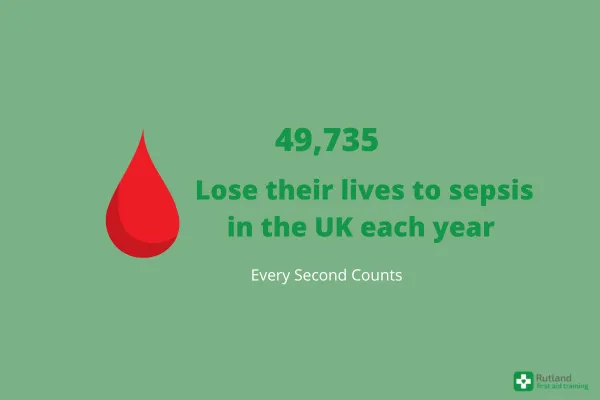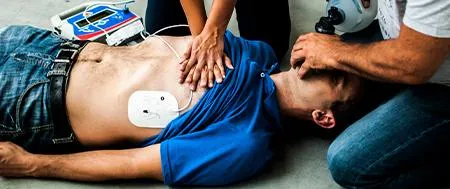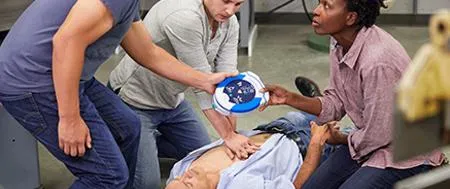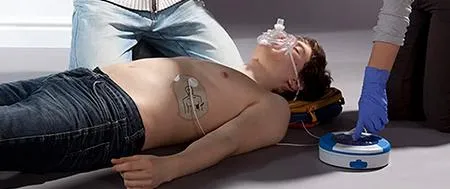Rutland First Aid Training
BLOG

Sepsis
What is Sepsis?
Sepsis (also known as blood poisoning) is the immune system's overreaction to an infection or injury. Normally our immune system fights infection – but sometimes, for reasons we don’t yet understand, it attacks our body’s own organs and tissues. If not treated immediately, sepsis can result in organ failure and death.
It can happen as a response to any injury or infection, anywhere in the body. It can result from:
A chest infection causing pneumonia
A urine infection in the bladder
A problem in the abdomen, such as a burst ulcer or a hole in the bowel
An infected cut or bite
A wound, trauma or surgery
A leg ulcer or cellulitis
Sepsis can be caused by a large number of different germs. Yet with early diagnosis, it can be treated with antibiotics.
Statistics about Sepsis
England, according to the report in the 2018 Lancet Journal of Respiratory Medicine by Prof Sir Brian Jarman, had a sepsis mortality rate of 20.3%. With around 245,000 patients developing sepsis annually in the UK, extrapolating this figure would mean that 49,735 lives are lost each year.
To put this into perspective, Sepsis kills more than breast, bowel and prostate cancer combined!
Bowel: 16,300 / Breast: 11,400 / Prostate: 11,700
Total = 39.400
https://www.cancerresearchuk.org/health-professional/cancer-statistics-for-the-uk
What are the Symptoms of Sepsis?
Sepsis can initially look like flu, gastroenteritis or a chest infection. There is no one sign, and symptoms present differently between adults and children.
There are three stages of sepsis: sepsis, severe sepsis and septic shock.
Although sepsis can be potentially life-threatening, it can range from being mild to severe. There is a higher rate of recovery in mild cases, and being able to recognise the signs and symptoms early greatly increases the patients chance of a better recovery.
Better Awareness can save lives
Symptoms of Sepsis in Adults

Symptoms of Sepsis in Babies and or Young Children

What is Maternal and Postpartum Sepsis?
Pregnant women and women who have recently given birth are at risk of developing maternal or postpartum sepsis. This can be caused by complications during pregnancy or birth, invasive procedures and infections (which sometimes can be unrelated to pregnancy such as urine infections).
Treatment of Sepsis
Sepsis
You must have two of the following symptoms before a doctor can diagnose sepsis:
A fever above 38 degrees celsius or a temperature below 36 degrees celsius
A heart rate higher than 90 beats per minute
Breathing rate higher than 20 breaths per minute
Probable or confirmed infection
Severe Sepsis
Severe sepsis occurs when there is organ failure. You must have one or more of the following signs to be diagnosed with severe sepsis.
Patches of discoloured skin
Decreased urination
Changes in mental ability
Low platelet (Blood clotting cells) count
Problems breathing
Abnormal heart functions
Chills due to fall in body temperature
Unconsciousness
Extreme weakness
Septic Shock
Symptoms of septic shock include symptoms of severe sepsis, plus a very low blood pressure.
Don’t wait, especially if you seem to be deteriorating. If someone has one or more of the symptoms, call 999. If you are concerned about an infection call 111 or Contact your GP and just say “I am concerned about sepsis”.
Hear what our first aid students have to say...
TESTIMONIALS


A really good training course, very professionally presented by Tracy. I’ve been on lots of training courses over the years and too often they can be soporific! Tracy is one of those rare training professionals who can deliver training and keep a person interested all day! Great course. Highly recommended!

Alan Eager
Google Review


Rutland first aid are professional yet kept the courses fun and interactive and use some very interesting props. As a driving instructor I wanted to be able to deal with any issues with my students but also any issues I may come across on the roads. Highly recommended.

James Dames
Google Review


Couldn't recommend Tracy and her team enough for a first aid course. Having to renew it every 3 years used to send me to sleep. Not with these guys! Professional, up to date and with lots of toys to play with, without the death by powerpoint.

Mike Gould
Google Review

Here at Rutland First Aid Training we strive to provide high quality, personalised, fun and informative first aid courses.
Our courses are recognised by HSE, Ofsted and follow ILCOR guidelines.
Short Cuts
Find what you are looking for:
Get In Touch
If you have any questions or would like to discuss your requirements in further detail, our team are always happy to assist you.
1 Old Station Yard, Whissendine Road, Ashwell, Rutland LE15 7SP
@ 2023 Copyright Rutland First Aid Training. All rights reserved.
Rutland First Aid Training is a trading name of Dive Rutland Limited. Company No: 9433835.




